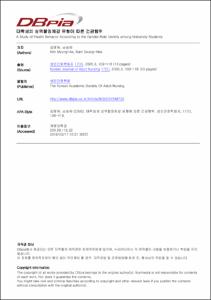대학생의 성역할정체감 유형에 따른 건강행위
- Keimyung Author(s)
- Kim, Myung Ae
- Department
- Dept. of Nursing (간호학)
- Journal Title
- 성인간호학회지
- Issued Date
- 2005
- Volume
- 17
- Issue
- 1
- Keyword
- Gender role; Gender identity; Health behavior; Student
- Abstract
- Purpose: The purpose of this study was to investigate gender role identity and health behavior and to explore the relationship between gender role identity and health behavior among university student. Method: Participants were 245 university students who lived in Daegu. Each participant was administered the KGRII(Korean Gender Role Identity Inventory), and Healthy Life Style: A self-test provided by ODDHP National Health Information Center. The collected data was analyzed using descriptive statistics, t-test, ANOVA, χ²-test with SPSS 11.0 PC Program. Result: 1. As a result of health behavior level, male students had more health risk behavior problems than female students in smoking(p=.00) and drinking (p=.03). Female students had more health risk behavior problems than male students in exercise and physical activity(p=.00). 2. For female students, feminity type (29.3%) was most common, subjects of undifferentiated type was 26.4%. For male students, masculinity type(32.4%) was most prevalent, and androgenic type was 31.4%. 3. Androginy typed group had more healthy behavior compared with other gender role identity typed group. In contrast, undifferentiated typed group had more high risk behavior compared with other typed group for all of health behavior. Conclusion: These results suggest that gender role identity is a stronger predictor of heath related variable than is sex of subject. Therefore effect methods to develop health promotion program should consider not only sex difference but gender role identity.
- Alternative Title
- A Study of Health Behavior According to the Gender Role Identity among University Students
- Keimyung Author(s)(Kor)
- 김명애
- Publisher
- College of Nursing
- Citation
- 김명애 and 남승희. (2005). 대학생의 성역할정체감 유형에 따른 건강행위. 성인간호학회지, 17(1), 109–118.
- Type
- Article
- ISSN
- 1225-4886
- Appears in Collections:
- 2. College of Nursing (간호대학) > Dept. of Nursing (간호학)
- 파일 목록
-
-
Download
 oak-bbb-4460.pdf
기타 데이터 / 399.5 kB / Adobe PDF
oak-bbb-4460.pdf
기타 데이터 / 399.5 kB / Adobe PDF
-
Items in Repository are protected by copyright, with all rights reserved, unless otherwise indicated.